Module 6 The Internet and Telecommunications grammar vocabulary and reading
文档属性
| 名称 | Module 6 The Internet and Telecommunications grammar vocabulary and reading |
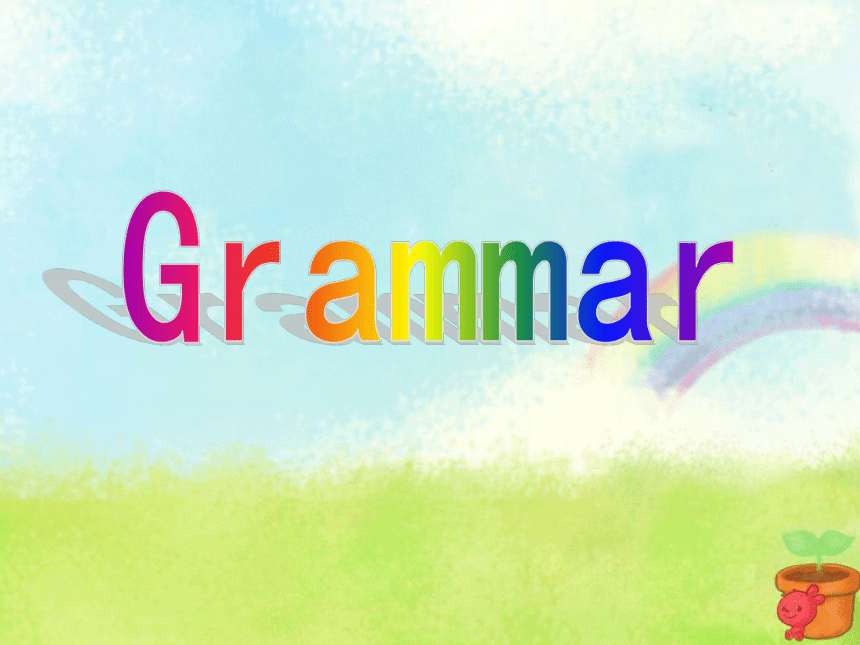
|
|
| 格式 | rar | ||
| 文件大小 | 321.4KB | ||
| 资源类型 | 教案 | ||
| 版本资源 | 外研版 | ||
| 科目 | 英语 | ||
| 更新时间 | 2011-12-09 00:00:00 | ||
图片预览

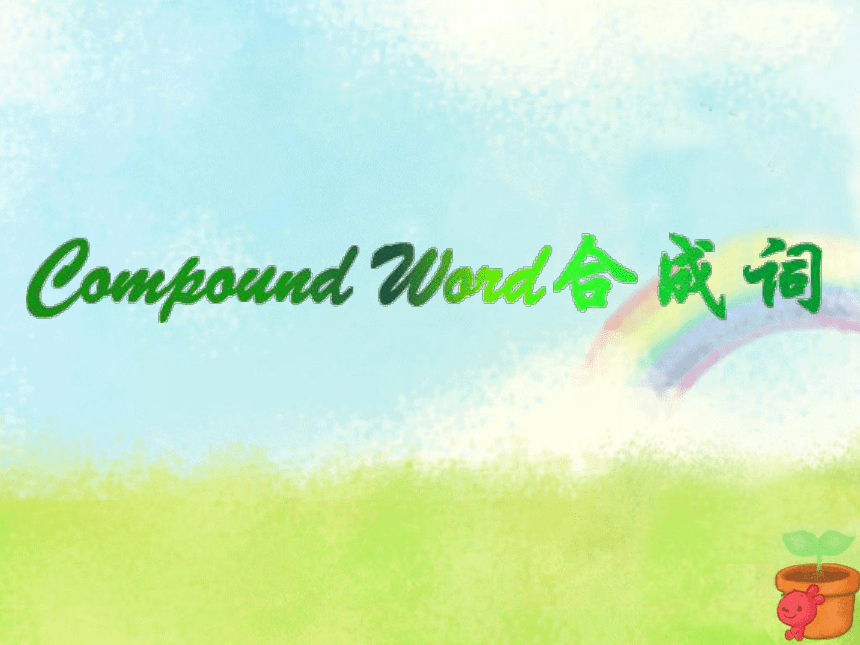
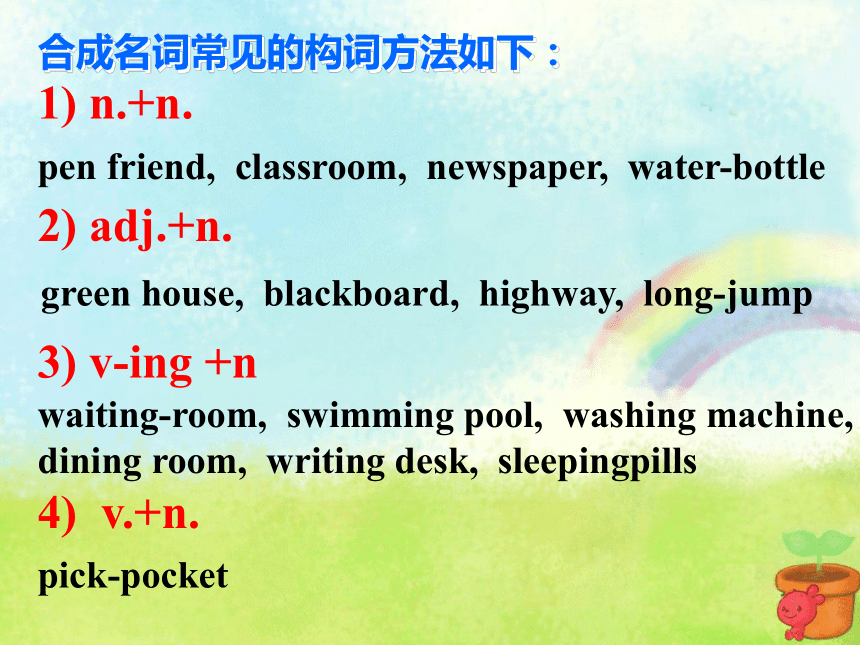
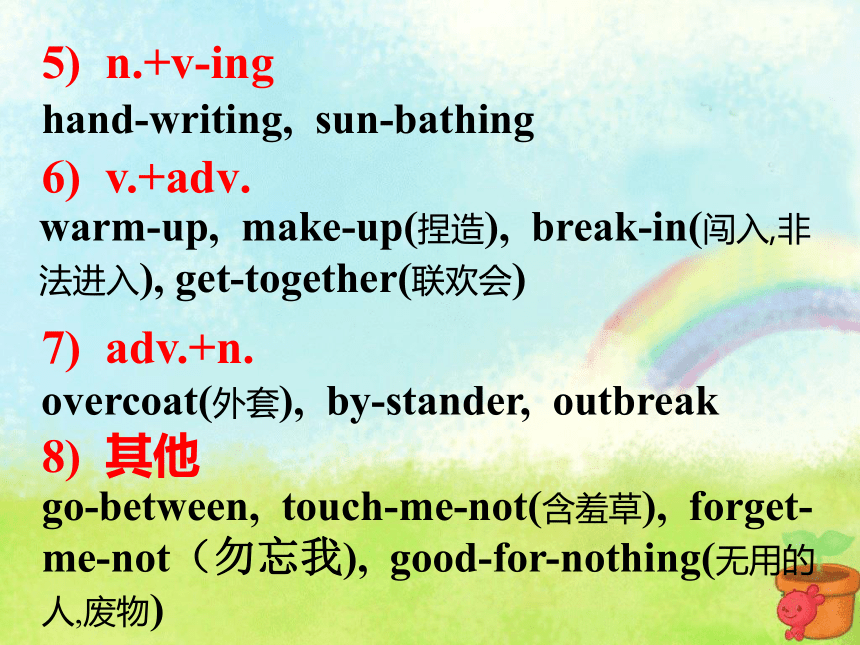
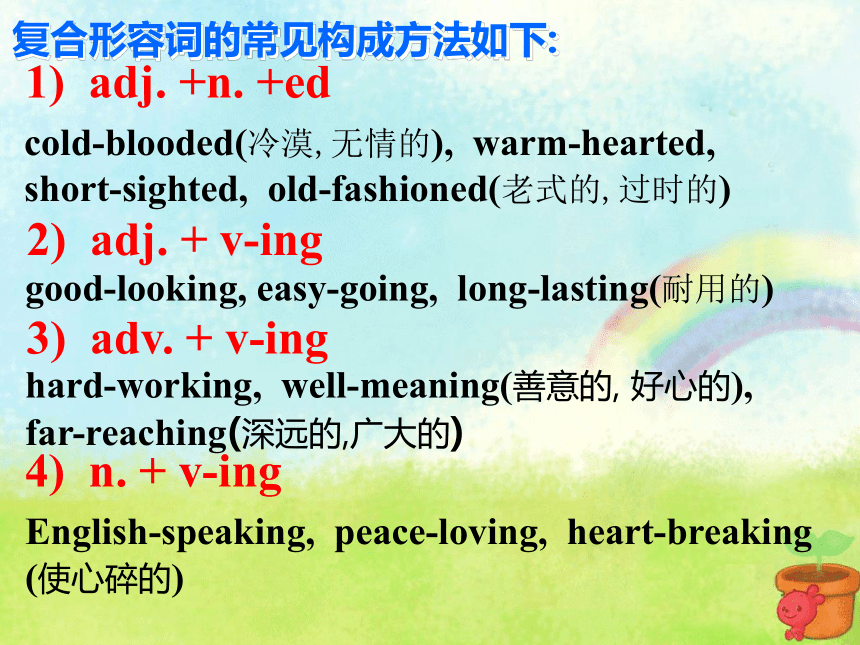
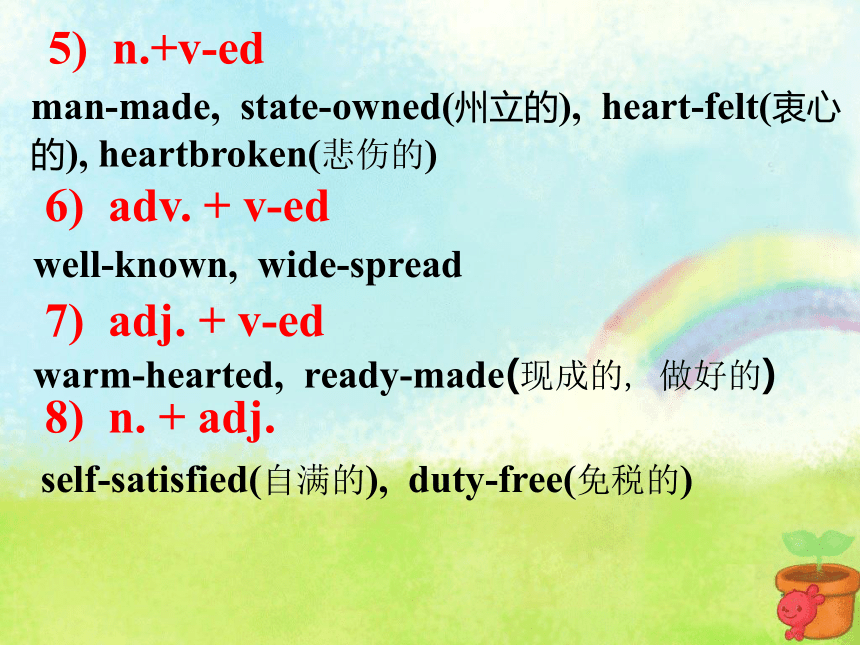
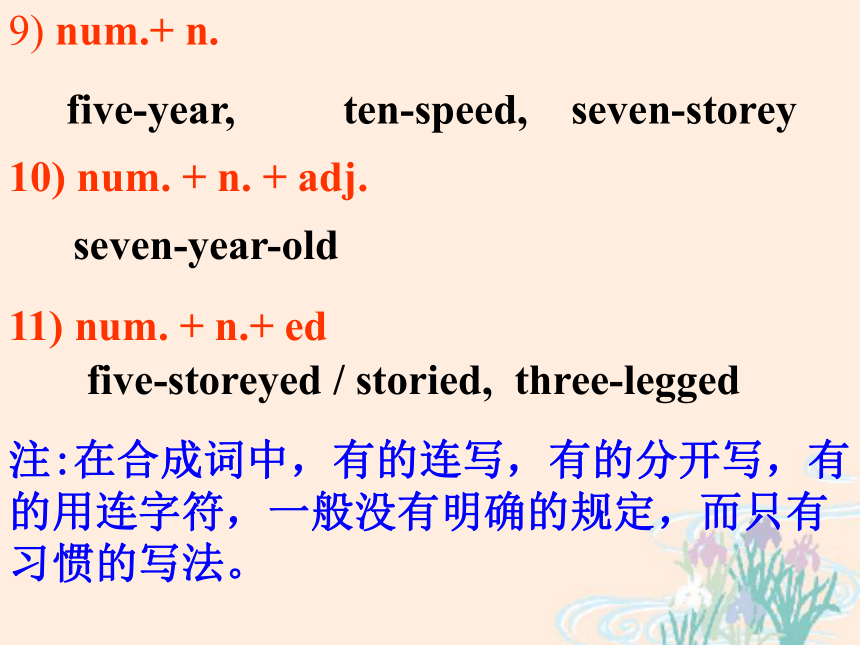
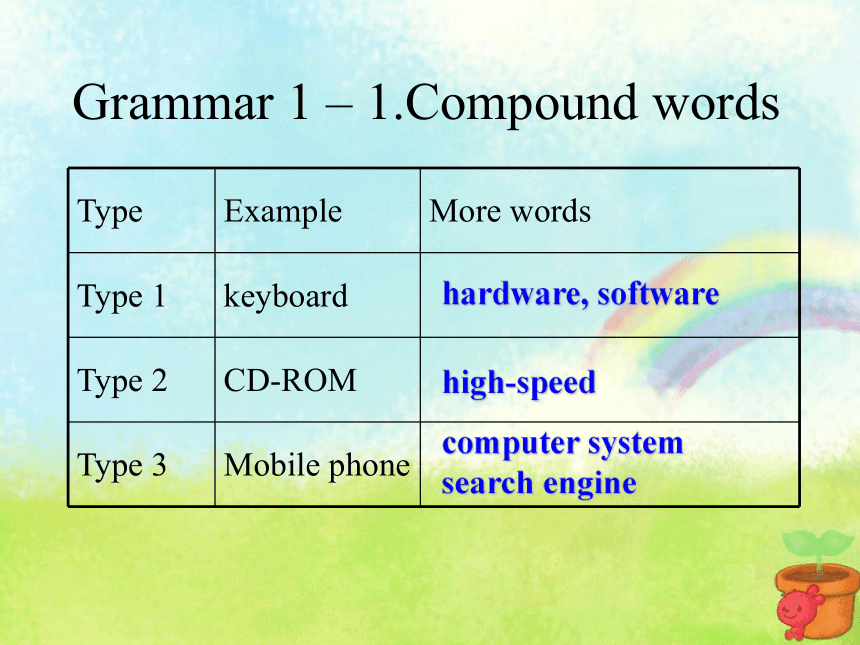
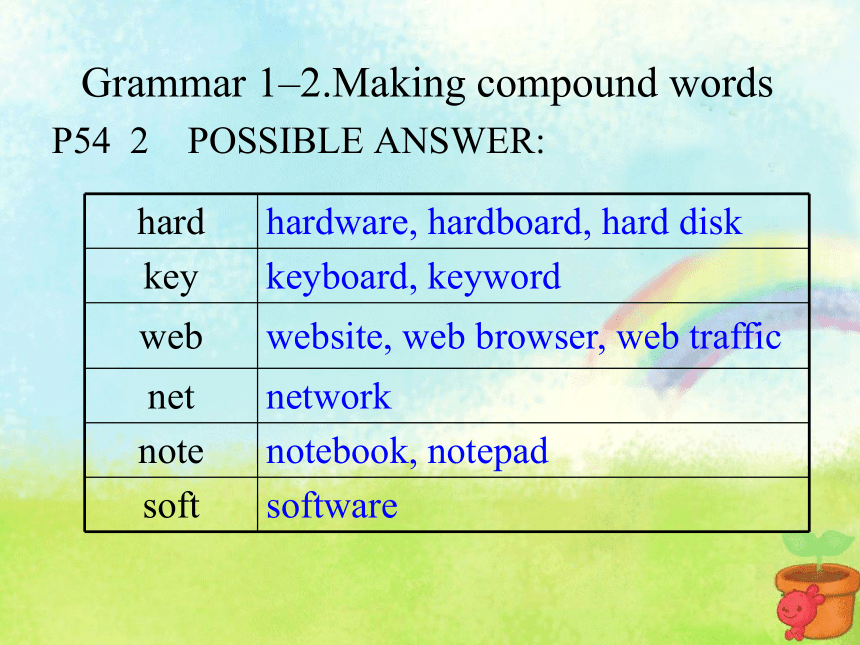
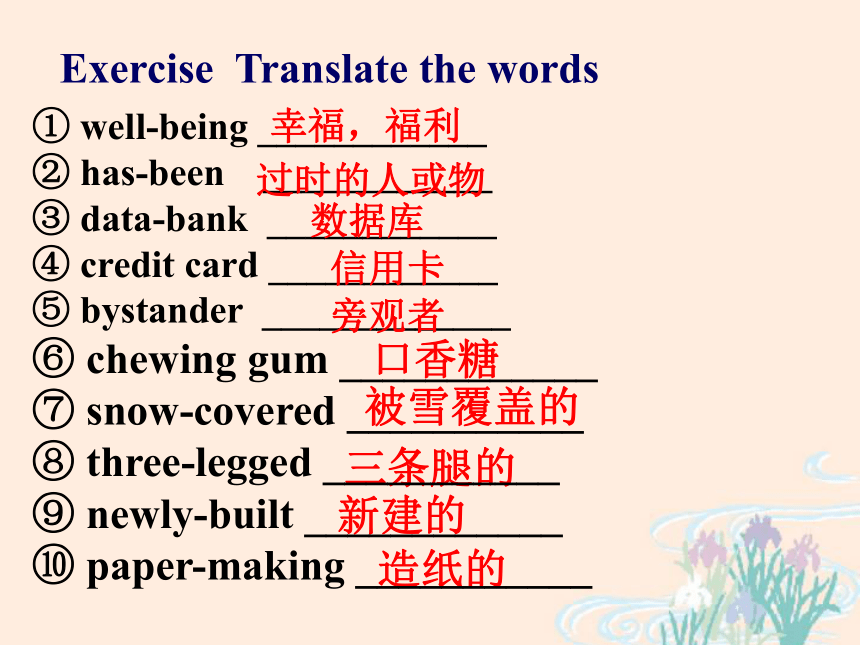
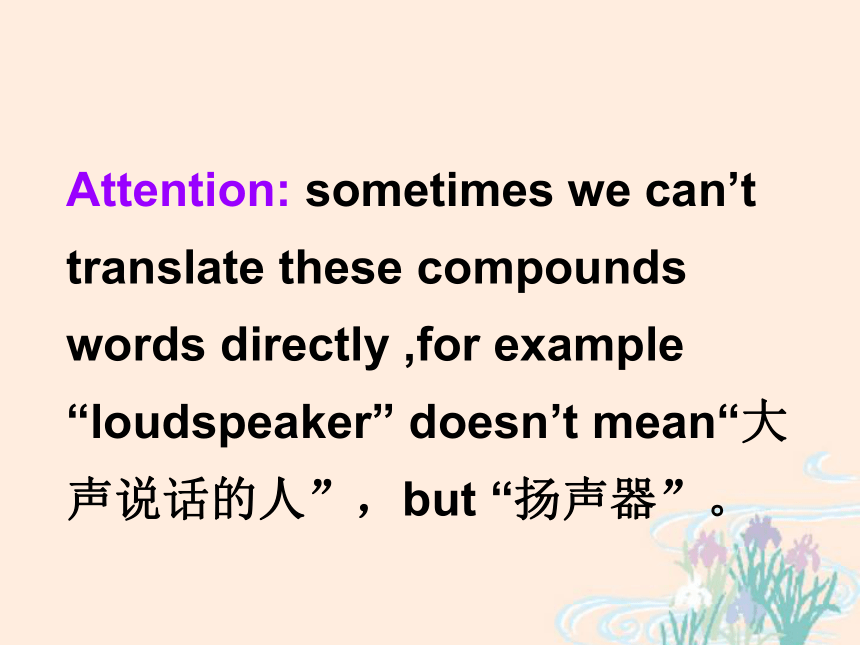
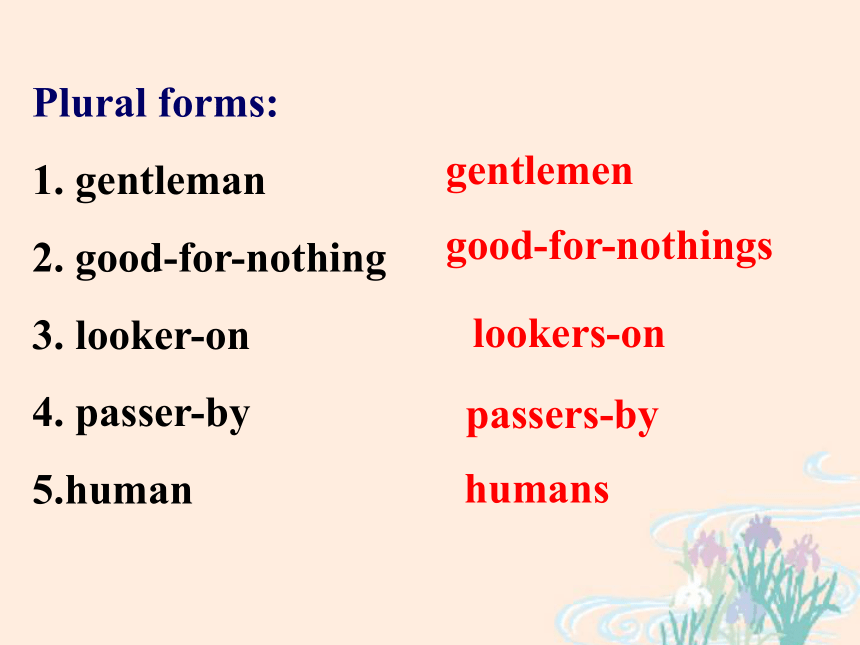
文档简介
(共40张PPT)
合成名词常见的构词方法如下:
1) n.+n.
pen friend, classroom, newspaper, water-bottle
2) adj.+n.
green house, blackboard, highway, long-jump
3) v-ing +n
waiting-room, swimming pool, washing machine,
dining room, writing desk, sleepingpills
4) v.+n.
pick-pocket
5) n.+v-ing
hand-writing, sun-bathing
6) v.+adv.
warm-up, make-up(捏造), break-in(闯入,非
法进入), get-together(联欢会)
7) adv.+n.
overcoat(外套), by-stander, outbreak
8) 其他
go-between, touch-me-not(含羞草), forget-me-not(勿忘我), good-for-nothing(无用的人,废物)
复合形容词的常见构成方法如下:
1) adj. +n. +ed
cold-blooded(冷漠,无情的), warm-hearted,
short-sighted, old-fashioned(老式的,过时的)
2) adj. + v-ing
good-looking, easy-going, long-lasting(耐用的)
3) adv. + v-ing
hard-working, well-meaning(善意的, 好心的),
far-reaching(深远的,广大的)
4) n. + v-ing
English-speaking, peace-loving, heart-breaking
(使心碎的)
6) adv. + v-ed
well-known, wide-spread
7) adj. + v-ed
warm-hearted, ready-made(现成的, 做好的)
8) n. + adj.
self-satisfied(自满的), duty-free(免税的)
5) n.+v-ed
man-made, state-owned(州立的), heart-felt(衷心
的), heartbroken(悲伤的)
9) num.+ n.
five-year, ten-speed, seven-storey
10) num. + n. + adj.
seven-year-old
11) num. + n.+ ed
five-storeyed / storied, three-legged
注:在合成词中,有的连写,有的分开写,有的用连字符,一般没有明确的规定,而只有习惯的写法。
Grammar 1 – 1.Compound words
Type Example More words
Type 1 keyboard
Type 2 CD-ROM
Type 3 Mobile phone
hardware, software
high-speed
computer system
search engine
Grammar 1–2.Making compound words
P54 2 POSSIBLE ANSWER:
hard hardware, hardboard, hard disk
key keyboard, keyword
web website, web browser, web traffic
net network
note notebook, notepad
soft software
口香糖
被雪覆盖的
三条腿的
新建的
造纸的
Exercise Translate the words
① well-being ____________
② has-been ____________
③ data-bank ____________
④ credit card ____________
⑤ bystander _____________
⑥ chewing gum ____________
⑦ snow-covered ___________
⑧ three-legged ___________
⑨ newly-built ____________
⑩ paper-making ___________
幸福,福利
过时的人或物
数据库
信用卡
旁观者
Attention: sometimes we can’t translate these compounds words directly ,for example “loudspeaker” doesn’t mean“大声说话的人”,but “扬声器”。
Plural forms:
gentleman
2. good-for-nothing
3. looker-on
4. passer-by
5.human
gentlemen
good-for-nothings
lookers-on
passers-by
humans
Plural forms
6. sister-in-law
7. man doctor
8. woman teacher
9. girl student
10. boy student
11. grown-up
12. go-between
sisters-in-law
men doctors
women teachers
girl students
boy students
grown-ups
go-betweens
注意:1)合成名词的所有格在最后一个词尾加’s。如:
his son-in-law’s car他女婿的车
2)合成形容词中的名词一般用单数形式。
如:a ten-year-old boy
an eight-hundred-word composition
a five-storey building
定冠词与零冠词
冠词的定义
冠词是置于名词之前、说明名词所表示的人
或事物的一种虚词。冠词也可以说是名词的
一种标志,它不能离开名词而单独存在。
冠词有三种:即定冠词(definite article)、
不定冠词 (indefinite article)和零冠词
(zero article)。
不定冠词有两个形式,一个是a, 另一个是
an. a 用在辅音(指的是音标不是指字母)开头
的词前,an 用在以元音开头的词前。
填a /an:
____ university ____ hour
____ European ____ honest boy
____ umbrella ____ one-act play
____ X-ray examination ____ “m”
a
an
a
an
an
a
an
an
不定冠词的基本用法
①泛指某一类人或事物的“一个”。例如:
A boy is waiting for you.
②表示一类人或事物,例如:
A horse is an animal.
③用于首次提到的人或物的单数名词前面。
An old cock is sitting in a tall tree.
④用于描写自然现象的名词前,表示“一阵”、“一场”、“一股”等。例如:
a snow 一场雪 a shower 一阵暴雨
a smoke 一股烟
⑤用在抽象名词之前表示具体介绍:是什么样的人,是什么样的事物。例如:
The little girl is a joy to her parents.
He is a success.
It is a pleasure to work with you.
What a great surprise you gave me.
⑥用于人名前,表示“一个……式的人;一个名叫……的人”
A Mr. Li is waiting for you.
He is a Lei Feng.
⑦用于“ of +a / an + n.”结构中,相当于the same。
They are of an age. 他们是同龄人。
Things of a kind come together.物以类聚。
⑧用于序数词前,表示”又一,再一”。
He tried a second time.他又试了一次。
⑨用于物质名词前表示“一种、一份、一杯”。
Please give me a coffee.
Green tea is a wonderful tea.
⑩用于“时间、重量、长度”等单位词前表示“每一”。We work 8 hours a day.
_ How much is it _ Two yuan a kilo.
还可用于一些固定短语中。
have a pain /cold / cough / fever / headache
have a rest / break / look / word / a good time
for a while / moment
a little / a few / a bit / a lot of
in a word / in a hurry
a good / great many
all of a sudden
once upon a time
a good knowledge of
突然
从前
了解、掌握
定冠词the的用法
1. 特指某(些)人或某(些)事物或双方都明白的人或物。
The book on the desk is mine.
She is the girl who won the prize.
2. 指上文已出现过或者说话者刚才谈及的人或事物
An old man lived in a small house near a forest. One
day the old man left the house and went into the forest
to gather wood.
3. 表示世界上独一无二的事物。但space(太空),
nature(自然界), man(人类),society(社会)例外
The sun is bigger than the moon.
4. 用于单数可数名词或形容词前,表示一类人或事物的整体.
Take care of the wounded and the dying.(救死扶伤)
5. 可以和某些集合名词连用,表示整个民族、阶级、阶层等
The English have a wonderful sense of humor.
The Chinese people are the greatest in the world.
6. 船只, 旅馆, 剧院, 建筑 以及某些著作, 乐曲,报刊等的
名词前常加定冠词
The People's Daily is read through out the whole
nation.
7. 用于江、河、湖、海洋、山脉、群岛、海峡、海湾等专有名称前
the Yellow River, the English channel, the
Taiwan Straits, the Indian Ocean, the Philippines
8.用于姓的复数前, 指全家或夫妇俩
the Zhangs, the Smiths, the Whites.
9. 由普通名词构成的专有名词(某些国名,政治组织,
机构,学校,建筑,报刊杂志等)很多要加定冠词.
1) 某些国名及政治组织名称
the United States, the United Nations, the House
of Commons
2) 某些学校、机构及建筑等名称:
the British Museum, the Midland Bank
3) 某些报刊杂志的名称
the New Times, the Washington Post, the Daily
News
10. 用于身体部位、计量单位、方位名词、年代、乐器名称发明物等名词前要用定冠词。
hit sb. in the face, have a pain in the leg
catch sb. by the arm
be paid by the hour/ day / month
sell sth. by the dozen
on the left/ right, in the east / west / south of
in the 1960’s, play the piano / violin
Who invented the telephone
11. 与same(相同的), only(唯一的), very(正好、恰好的)搭配。
He is the very man I am looking for.
12. 用在习惯用语中。
in the morning / afternoon / evening
the day after tomorrow
by the way, go to the cinema / theatre
in the middle of, in the sky, in the dark
in the country, at the end of
注意下面短语的区别:
a number of the number of
for a moment for the moment
a most beautiful city
the most beautiful city
the world a wonderful world
the moon a full moon
零冠词的用法
1. 一些专有名词前如国名,人名前通常不用定冠词:
England, Mary, China
2.泛指的复数名词,表示一类人或事物时,可不
用定冠词
Women live longer than men in most countries.
They are teachers.
3. 抽象名词表示一般概念时,通常不加冠词
Failure is the mother of success.失败乃成功之母。
Life is short, art is long. 生命短暂,而艺术长存.
4. 物质名词表示一般概念时,通常不加冠词,当
表示特定的意思时,需要加定冠词;
Man cannot live without water.人离开水就无法生存。
5. 在季节、月份、节日、 假日、日期、星期等表示
时间的名词之前,不加冠词;中国传统节日要带冠词。
We go to school from Monday to Friday.
The Spring Festival is drawing near.
Leaves turn yellow in Autumn.
6. 在称呼和做表语、补语、同位语的身份、职业、官衔、职位
的名词前不加冠词;
The guards took the American to General Lee.
You can’t mix oil with water.你不要把油和水混合.
Now he is manager of a bank.
7. 在三餐、球类运动和娱乐运动的名称前,不加冠词
What would you like for breakfast, sir
8. 当by 与火车,轮船,飞机等交通工具连用,表示一种
方式时,中间无冠词;by bus,by train
9. 有些抽象化的个体名词前一般不用冠词;如: school, college, prison, sea, market, hospital, bed,
table, class, town, church, court, work, university
等个体名词,直接置于介词后,表示该名词的深层含义
go to hospital 去医院看病 go to the hospital 去医院
(并不是去看病,而是有其他目的)
He has been in prison for five years.
10. 在daybreak, dawn, noon, midnight, night,
sunset, sunrise这类事件名词前都不加冠词.
He used to wake up at daybreak everyday.
11. 下面这类名词前通常不加冠词:
大多数街名, 广场名(Times Square), 车站,机场,公园,
桥梁名(London Bridge),大学名(Yale University),
节日名(National Day, New Year’s Day),多数杂志名
(Time, Reader’s Digest),
12. 很多情况下,是否要加冠词,常常是一个习惯用法问
题,特别是在一些固定的词组中,有时是说不出的道理
in town in the city 在城里
catch cold have a cold 感冒了
at a distance 在一定距离外 in the distance 在远处
13. 不用冠词的序数词:
1)序数词前有物主代词:my first teacher
序数词作副词用:He came first in the race.
固定词组中:at first, first of all, from first to last, first aid
14. 两个名词并列,表同一概念或一个人同时兼有两种身份时,后面一个名词前不用冠词。
a knife and fork, a teacher and writer
15. “普通名词+as / though”开头的让步状语从句,名词前不用冠词。Child as he is, he knows a lot.
16.在独立主格结构中,“名词+介词+名词”中的名词前不用冠词。He came in, book in hand.
17. turn表示“变为,成为”时,后面的名词不带冠词。
He was a teacher before he turned writer.
18.在“type of / kind of/ sort of +名词”结构中,名词前不带冠词。What sort of man is he
19.学科名词前不带冠词。He likes maths very much.
20.在表示“孤岛、独山”的名词前不用冠词。
Mount Emei, Tasmania Island
Grammar 2 –.Discussion
Conclusion:
定冠词用于特指某(些)人或某(些)物。
用法 例子
用在表示宇宙间独一无二的名词前
在含有名词的专有名词(国名、组织机构名、建筑物名)前
在单数名词前,表示类别
在某些形容词前,表示“一类人”
the world, the universe, the sun, the moon the Internet
the United States, the Great Wall, the White House
the panda
the young, the old, the wounded
Grammar 2 –.Zero articles(4m)
category examples
Continents
Countries and cities
Plural and uncountable nouns in general statements
Asia, Europe, Oceania, America, Antarctica
China, Argentina, Australia, India, France (exceptions: the Netherlands, the Lebanon
Snow is cold.
Guns are dangerous.
Grammar 2 –.Conclusion(4m)
用法 例示
专有名词(国名、地名、人名等)
物质名词表示一般概念时
抽象名词表示一般概念时
泛指的复数名词表示“一类人或物”时
Asia, China, London, David, Class Four, Miss Smith
Fish can’t live without water.
Gold is expensive.
Knowledge is power.
Wisdom is better than strength.
Everyone agrees that computers are very important.
Grammar 2 Work in pairs. Do exercises 3 and 4.
3. ANSWER 4. ANSWER
a
a
the
a
a
the
/
the
/
The, /
Homework
Task:
Collect names of different organizations or companies on the street. Pay attention to the usage of article or zero article.
合成名词常见的构词方法如下:
1) n.+n.
pen friend, classroom, newspaper, water-bottle
2) adj.+n.
green house, blackboard, highway, long-jump
3) v-ing +n
waiting-room, swimming pool, washing machine,
dining room, writing desk, sleepingpills
4) v.+n.
pick-pocket
5) n.+v-ing
hand-writing, sun-bathing
6) v.+adv.
warm-up, make-up(捏造), break-in(闯入,非
法进入), get-together(联欢会)
7) adv.+n.
overcoat(外套), by-stander, outbreak
8) 其他
go-between, touch-me-not(含羞草), forget-me-not(勿忘我), good-for-nothing(无用的人,废物)
复合形容词的常见构成方法如下:
1) adj. +n. +ed
cold-blooded(冷漠,无情的), warm-hearted,
short-sighted, old-fashioned(老式的,过时的)
2) adj. + v-ing
good-looking, easy-going, long-lasting(耐用的)
3) adv. + v-ing
hard-working, well-meaning(善意的, 好心的),
far-reaching(深远的,广大的)
4) n. + v-ing
English-speaking, peace-loving, heart-breaking
(使心碎的)
6) adv. + v-ed
well-known, wide-spread
7) adj. + v-ed
warm-hearted, ready-made(现成的, 做好的)
8) n. + adj.
self-satisfied(自满的), duty-free(免税的)
5) n.+v-ed
man-made, state-owned(州立的), heart-felt(衷心
的), heartbroken(悲伤的)
9) num.+ n.
five-year, ten-speed, seven-storey
10) num. + n. + adj.
seven-year-old
11) num. + n.+ ed
five-storeyed / storied, three-legged
注:在合成词中,有的连写,有的分开写,有的用连字符,一般没有明确的规定,而只有习惯的写法。
Grammar 1 – 1.Compound words
Type Example More words
Type 1 keyboard
Type 2 CD-ROM
Type 3 Mobile phone
hardware, software
high-speed
computer system
search engine
Grammar 1–2.Making compound words
P54 2 POSSIBLE ANSWER:
hard hardware, hardboard, hard disk
key keyboard, keyword
web website, web browser, web traffic
net network
note notebook, notepad
soft software
口香糖
被雪覆盖的
三条腿的
新建的
造纸的
Exercise Translate the words
① well-being ____________
② has-been ____________
③ data-bank ____________
④ credit card ____________
⑤ bystander _____________
⑥ chewing gum ____________
⑦ snow-covered ___________
⑧ three-legged ___________
⑨ newly-built ____________
⑩ paper-making ___________
幸福,福利
过时的人或物
数据库
信用卡
旁观者
Attention: sometimes we can’t translate these compounds words directly ,for example “loudspeaker” doesn’t mean“大声说话的人”,but “扬声器”。
Plural forms:
gentleman
2. good-for-nothing
3. looker-on
4. passer-by
5.human
gentlemen
good-for-nothings
lookers-on
passers-by
humans
Plural forms
6. sister-in-law
7. man doctor
8. woman teacher
9. girl student
10. boy student
11. grown-up
12. go-between
sisters-in-law
men doctors
women teachers
girl students
boy students
grown-ups
go-betweens
注意:1)合成名词的所有格在最后一个词尾加’s。如:
his son-in-law’s car他女婿的车
2)合成形容词中的名词一般用单数形式。
如:a ten-year-old boy
an eight-hundred-word composition
a five-storey building
定冠词与零冠词
冠词的定义
冠词是置于名词之前、说明名词所表示的人
或事物的一种虚词。冠词也可以说是名词的
一种标志,它不能离开名词而单独存在。
冠词有三种:即定冠词(definite article)、
不定冠词 (indefinite article)和零冠词
(zero article)。
不定冠词有两个形式,一个是a, 另一个是
an. a 用在辅音(指的是音标不是指字母)开头
的词前,an 用在以元音开头的词前。
填a /an:
____ university ____ hour
____ European ____ honest boy
____ umbrella ____ one-act play
____ X-ray examination ____ “m”
a
an
a
an
an
a
an
an
不定冠词的基本用法
①泛指某一类人或事物的“一个”。例如:
A boy is waiting for you.
②表示一类人或事物,例如:
A horse is an animal.
③用于首次提到的人或物的单数名词前面。
An old cock is sitting in a tall tree.
④用于描写自然现象的名词前,表示“一阵”、“一场”、“一股”等。例如:
a snow 一场雪 a shower 一阵暴雨
a smoke 一股烟
⑤用在抽象名词之前表示具体介绍:是什么样的人,是什么样的事物。例如:
The little girl is a joy to her parents.
He is a success.
It is a pleasure to work with you.
What a great surprise you gave me.
⑥用于人名前,表示“一个……式的人;一个名叫……的人”
A Mr. Li is waiting for you.
He is a Lei Feng.
⑦用于“ of +a / an + n.”结构中,相当于the same。
They are of an age. 他们是同龄人。
Things of a kind come together.物以类聚。
⑧用于序数词前,表示”又一,再一”。
He tried a second time.他又试了一次。
⑨用于物质名词前表示“一种、一份、一杯”。
Please give me a coffee.
Green tea is a wonderful tea.
⑩用于“时间、重量、长度”等单位词前表示“每一”。We work 8 hours a day.
_ How much is it _ Two yuan a kilo.
还可用于一些固定短语中。
have a pain /cold / cough / fever / headache
have a rest / break / look / word / a good time
for a while / moment
a little / a few / a bit / a lot of
in a word / in a hurry
a good / great many
all of a sudden
once upon a time
a good knowledge of
突然
从前
了解、掌握
定冠词the的用法
1. 特指某(些)人或某(些)事物或双方都明白的人或物。
The book on the desk is mine.
She is the girl who won the prize.
2. 指上文已出现过或者说话者刚才谈及的人或事物
An old man lived in a small house near a forest. One
day the old man left the house and went into the forest
to gather wood.
3. 表示世界上独一无二的事物。但space(太空),
nature(自然界), man(人类),society(社会)例外
The sun is bigger than the moon.
4. 用于单数可数名词或形容词前,表示一类人或事物的整体.
Take care of the wounded and the dying.(救死扶伤)
5. 可以和某些集合名词连用,表示整个民族、阶级、阶层等
The English have a wonderful sense of humor.
The Chinese people are the greatest in the world.
6. 船只, 旅馆, 剧院, 建筑 以及某些著作, 乐曲,报刊等的
名词前常加定冠词
The People's Daily is read through out the whole
nation.
7. 用于江、河、湖、海洋、山脉、群岛、海峡、海湾等专有名称前
the Yellow River, the English channel, the
Taiwan Straits, the Indian Ocean, the Philippines
8.用于姓的复数前, 指全家或夫妇俩
the Zhangs, the Smiths, the Whites.
9. 由普通名词构成的专有名词(某些国名,政治组织,
机构,学校,建筑,报刊杂志等)很多要加定冠词.
1) 某些国名及政治组织名称
the United States, the United Nations, the House
of Commons
2) 某些学校、机构及建筑等名称:
the British Museum, the Midland Bank
3) 某些报刊杂志的名称
the New Times, the Washington Post, the Daily
News
10. 用于身体部位、计量单位、方位名词、年代、乐器名称发明物等名词前要用定冠词。
hit sb. in the face, have a pain in the leg
catch sb. by the arm
be paid by the hour/ day / month
sell sth. by the dozen
on the left/ right, in the east / west / south of
in the 1960’s, play the piano / violin
Who invented the telephone
11. 与same(相同的), only(唯一的), very(正好、恰好的)搭配。
He is the very man I am looking for.
12. 用在习惯用语中。
in the morning / afternoon / evening
the day after tomorrow
by the way, go to the cinema / theatre
in the middle of, in the sky, in the dark
in the country, at the end of
注意下面短语的区别:
a number of the number of
for a moment for the moment
a most beautiful city
the most beautiful city
the world a wonderful world
the moon a full moon
零冠词的用法
1. 一些专有名词前如国名,人名前通常不用定冠词:
England, Mary, China
2.泛指的复数名词,表示一类人或事物时,可不
用定冠词
Women live longer than men in most countries.
They are teachers.
3. 抽象名词表示一般概念时,通常不加冠词
Failure is the mother of success.失败乃成功之母。
Life is short, art is long. 生命短暂,而艺术长存.
4. 物质名词表示一般概念时,通常不加冠词,当
表示特定的意思时,需要加定冠词;
Man cannot live without water.人离开水就无法生存。
5. 在季节、月份、节日、 假日、日期、星期等表示
时间的名词之前,不加冠词;中国传统节日要带冠词。
We go to school from Monday to Friday.
The Spring Festival is drawing near.
Leaves turn yellow in Autumn.
6. 在称呼和做表语、补语、同位语的身份、职业、官衔、职位
的名词前不加冠词;
The guards took the American to General Lee.
You can’t mix oil with water.你不要把油和水混合.
Now he is manager of a bank.
7. 在三餐、球类运动和娱乐运动的名称前,不加冠词
What would you like for breakfast, sir
8. 当by 与火车,轮船,飞机等交通工具连用,表示一种
方式时,中间无冠词;by bus,by train
9. 有些抽象化的个体名词前一般不用冠词;如: school, college, prison, sea, market, hospital, bed,
table, class, town, church, court, work, university
等个体名词,直接置于介词后,表示该名词的深层含义
go to hospital 去医院看病 go to the hospital 去医院
(并不是去看病,而是有其他目的)
He has been in prison for five years.
10. 在daybreak, dawn, noon, midnight, night,
sunset, sunrise这类事件名词前都不加冠词.
He used to wake up at daybreak everyday.
11. 下面这类名词前通常不加冠词:
大多数街名, 广场名(Times Square), 车站,机场,公园,
桥梁名(London Bridge),大学名(Yale University),
节日名(National Day, New Year’s Day),多数杂志名
(Time, Reader’s Digest),
12. 很多情况下,是否要加冠词,常常是一个习惯用法问
题,特别是在一些固定的词组中,有时是说不出的道理
in town in the city 在城里
catch cold have a cold 感冒了
at a distance 在一定距离外 in the distance 在远处
13. 不用冠词的序数词:
1)序数词前有物主代词:my first teacher
序数词作副词用:He came first in the race.
固定词组中:at first, first of all, from first to last, first aid
14. 两个名词并列,表同一概念或一个人同时兼有两种身份时,后面一个名词前不用冠词。
a knife and fork, a teacher and writer
15. “普通名词+as / though”开头的让步状语从句,名词前不用冠词。Child as he is, he knows a lot.
16.在独立主格结构中,“名词+介词+名词”中的名词前不用冠词。He came in, book in hand.
17. turn表示“变为,成为”时,后面的名词不带冠词。
He was a teacher before he turned writer.
18.在“type of / kind of/ sort of +名词”结构中,名词前不带冠词。What sort of man is he
19.学科名词前不带冠词。He likes maths very much.
20.在表示“孤岛、独山”的名词前不用冠词。
Mount Emei, Tasmania Island
Grammar 2 –.Discussion
Conclusion:
定冠词用于特指某(些)人或某(些)物。
用法 例子
用在表示宇宙间独一无二的名词前
在含有名词的专有名词(国名、组织机构名、建筑物名)前
在单数名词前,表示类别
在某些形容词前,表示“一类人”
the world, the universe, the sun, the moon the Internet
the United States, the Great Wall, the White House
the panda
the young, the old, the wounded
Grammar 2 –.Zero articles(4m)
category examples
Continents
Countries and cities
Plural and uncountable nouns in general statements
Asia, Europe, Oceania, America, Antarctica
China, Argentina, Australia, India, France (exceptions: the Netherlands, the Lebanon
Snow is cold.
Guns are dangerous.
Grammar 2 –.Conclusion(4m)
用法 例示
专有名词(国名、地名、人名等)
物质名词表示一般概念时
抽象名词表示一般概念时
泛指的复数名词表示“一类人或物”时
Asia, China, London, David, Class Four, Miss Smith
Fish can’t live without water.
Gold is expensive.
Knowledge is power.
Wisdom is better than strength.
Everyone agrees that computers are very important.
Grammar 2 Work in pairs. Do exercises 3 and 4.
3. ANSWER 4. ANSWER
a
a
the
a
a
the
/
the
/
The, /
Homework
Task:
Collect names of different organizations or companies on the street. Pay attention to the usage of article or zero article.
